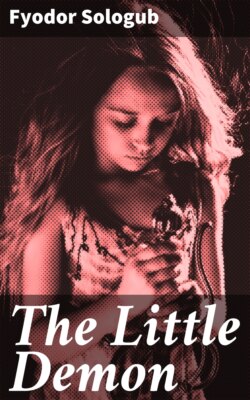Читать книгу The Little Demon - Fyodor Sologub - Страница 3
На сайте Литреса книга снята с продажи.
AUTHORISED TRANSLATION BY JOHN COURNOS AND RICHARD ALDINGTON ALFRED A. KNOPF NEW YORK MCMXVI TRANSLATORS' PREFACE
Оглавление"The Little Demon" is a successful and almost imperceptible merging of comedy with tragedy. It is in fact a tragedy in which the comic forms an integral part and is not sandwiched in superficially merely to please the reader. The method resembles in a measure that of Gogol's "Dead Souls," with which "The Little Demon" was compared upon its first appearance in 1907.
It is a work of art—and it is a challenge; and this challenge is addressed not to Russia alone, but to the whole world.
"What a sad place Russia is!" exclaimed Pushkin when Gogol read his story to him. But what the world knows to-day is that Gogol gave us a portrait of the human soul, and that only the frame was Russian. Prince Kropotkin assures us that there are Chichikovs in England, and Professor Phelps of Yale is equally emphatic about their presence in America.
And this is also true of Peredonov, of "The Little Demon."
In spite of its "local colour" and its portrayal of small town life in Russia, this novel has the world for its stage, and its chief actor, Peredonov, is a universal character. He is a Russian—an American—an Englishman. He is to be found everywhere, and in every station of life. Both translators agree that they have even met one or two Peredonovs at London literary teas—and not a few Volodins, for that matter.
Certainly there is a touch of Peredonov in many men. It is a matter of degree. For the extraordinary thing about this book is that nearly all the characters are Peredonovs of a lesser calibre. Their Peredonovism lacks that concentrated intensity which lifts the unfortunate Peredonov to tragic—and to comic—heights in spite of his pettiness; or perhaps because his pettiness is so gigantic.
"The Little Demon" is a penetration into human conscience, and a criticism of the state of petty "provinciality" into which it has fallen.
"The Kingdom of God is within you." So is the kingdom of evil. That is the great truth of "The Little Demon." And in Peredonov's case, the inner spirit takes possession of external objects, and all the concrete things that his eyes see become symbols of the evil that is within himself. More than that: this spirit even creates for him a "little grey, nimble beast"—the Nedotikomka—which is the sum of the evil forces of the world, and against which he has to contend.
The author enters his "hero's" condition so deeply that even people and objects and scenery are rendered, as it were, through Peredonov's eyes—and the mood created by this subjective treatment helps to inveigle the reader into comprehending the chief character.
The beautiful Sasha-Liudmilla episode relieves the Peredonovian atmosphere as a dab of vermilion relieves grey. But what the author shows us is that even such an idyllic love episode is affected by contact with this atmosphere, and that its beauty and innocence become obscured under the tissue of lies as under a coat of grey dust. This, as well as other aspects of "The Little Demon," are dealt with at length in my article on Feodor Sologub in "The Fortnightly Review" (September, 1915), and if I refrain from going over the ground again, it is because I hope that the tale is simple and clear enough to provide its own comment.
Finally, I may be pardoned for speaking of the difficulties of translating "The Little Demon." Not only is the original extraordinarily racy in parts and rich in current Russian slang—at times almost obscure in meaning, but the characters occasionally indulge in puns or speak in rhymes—rhyme-speaking is not uncommon among the peasant classes in Russia. In every case the translators have striven to give the English equivalent; where the difficulty was of a nature rendering this impossible, the translators have had to make use of absolutely unavoidable footnotes. The translators have also made every effort to preserve the mood of Sologubian descriptive prose, which is not always an easy matter, when you consider the natural pliancy of Russian and the comparatively rigid nature of English.
JOHN COURNOS
December 1915
